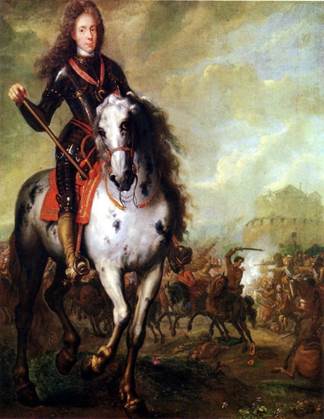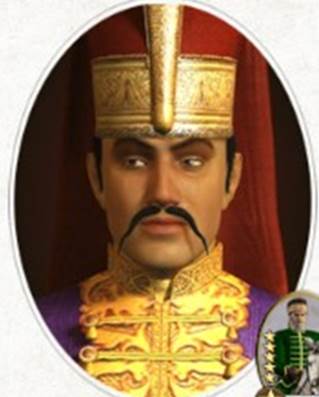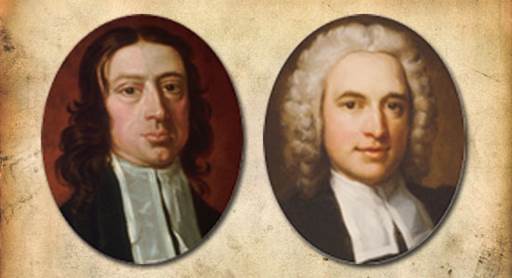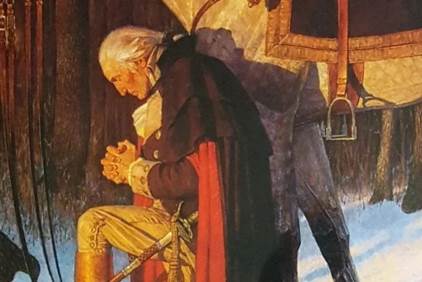Christian History
Fighting Muslims to Founding Georgia – Savoy, Oglethorpe, Wesleys, & Christianity

Christian History
“My people are destroyed for lack of knowledge.”
Hosea 4:6
Early in his career, Eugene of Savoy, under the command of Polish King Jan Sobieski, helped repel 200,000 Ottoman Turks on September 11, 1683, thus saving the city of Vienna, Austria.
Austrian Prince Eugene of Savoy went on to become one of Europe’s most famous commanders.

Savoy helped drive the Ottomans from Budapest in 1686. In 1687, he gallantly commanded a cavalry brigade defeating the Turkish army at the Second Battle of Mohács in Hungary. This defeat was so significant that the Ottoman army mutinied against its leadership, resulting in the Grand Vizier, Sarı Süleyman Pasha, being executed, and the Sultan, Mehmed IV, being deposed.
Prince Eugene of Savoy was famous for his victory over 100.000 Islamic warriors at the Battle of Zenta, Serbia, September 11, 1697. The Ottoman army then invaded Russia. The new Turkish Grand Vizier, Baltacı Mehmet, defeated Peter the Great’s Russian Army in the Russo-Turkish War (1710-1711). Turks then went on the offensive, invading Greece and Venetian territories, led by Turkish Grand Vizier Damat Ali in the Turkish-Venetian War (1714-1718).

Once again, Europe was rescued by Austrian Prince Eugene of Savoy in the Austro-Turkish War, 1716-1718. In 1716, Savoy defeated the Ottoman Turks at Petrovaradin, captured the Banat (areas of Romania, Serbia and Hungary) and the capital city of Timisoara. In 1717, Savoy recaptured Belgrade, Serbia, whose Christian population had been brutally crushed and enslaved by numerous Islamist campaigns dating back to 1521. Savoy’s successful halt of the Ottoman invasion into Europe resulted in the Turkish Empire suing for peace in 1718 with the Treaty of Passarowitz, as the sharia practice was, when you are strong fight without mercy, but when you are weak, make treaties until you can become strong again.
One of the young soldiers fighting at the Battle of Belgrade, who served as an aide-de-camp to Prince Savoy, was 17-year-old Englishman James Oglethorpe. At 21 he returned to England. He became a member of Parliament, where he served for 32 years, 1722-1754. In Parliament he became known for opposing slavery. Oglethorpe conceived of an idea for a colony in America where poor debtors and Christian refugees could get a second chance. He named the colony “Georgia” after Britain’s King George II.
Georgia’s Colonial Charter, 1732, stated regarding religious freedom: “There shall be a liberty of conscience allowed in the worship of God … and that all such persons, except papists [Roman Catholics], shall have a free exercise of their religion.” Soon Protestant refugees from Salzburg, Austria, called “Salzburgers,” settled the town of Ebenezer, Georgia. In 1735, Moravian Christian settlers from Bohemia arrived through Fort Argyle. Scottish Presbyterians arrived from New Inverness in 1736. Huguenot Protestant refugees had arrived from France.

James Oglethorpe’s secretary was Charles Wesley, the brother of John Wesley. John also went to Georgia but soon left in disgrace. This humbled him, and though he was considered a minister at the time, by his own testimony, he had not yet become a true Christian, having received the new birth in Jesus Christ. Later, the greatest evangelist during that time, George Whitefield came to Georgia, preaching to 10’s of thousands in the open air. Traditional churches slandered Whitefield and the Wesleys. The only places they could preach was outside in the open air.

Georgia established the Anglican Church as the Colony of Georgia’s official denomination, with a £25 per annum salary for every Anglican clergyman. Roman Catholics were specifically excluded from the colony. Beginning in 1755, Britain expelled all French Catholics from Acadia, Canada. Some 400 French Catholics arrived in Savannah, Georgia. They were only allowed to stay the winter before being ordered to leave.
Other Protestants arrived in Georgia. In 1772, Daniel Marshall established Kiokee Baptist Church – the first Baptist Church in Georgia. Georgia is also known for Polish General Casmir Pulaski, father of the American cavalry, who died fighting the British at Savannah. Georgia had many Revolutionary War patriots, such as Nancy Hart. While her husband was away, six British soldiers converged on their frontier home. Soldiers shot her prize gobbler and ordered her to cook it. After feeding and serving them lots of wine Nancy grabbed one of their guns, promising to shoot the first one that moved. After shooting two, her husband showed up and they hung the rest.
In 1777, Georgia passed its first State Constitution, stating: “We the people of Georgia, relying upon the protection and guidance of Almighty God, do ordain and establish this Constitution.” Georgia’s Constitution, 1777, Article 6 stated: “Representatives shall be chosen out of the residents in each county … and they shall be of the Protestant religion.”

President Washington wrote to a Hebrew Congregation in Savannah, Georgia, May 1790: “May the same wonder-working Deity, who long since delivered the Hebrews from their Egyptian oppressors, planted them in the promised land, whose Providential Agency has lately been conspicuous in establishing these United States as an independent nation, still continue to water them with the dews of Heaven, and make the inhabitants of every denomination partake in the temporal and spiritual blessings of that people, whose God is Jehovah.”
In 1836, Methodists founded Emory College, named after Methodist Bishop John Emory, in the city of Oxford, and Wesleyan Female College at Macon — the first institution of learning founded specifically for women in America.
Georgia was devastated as the Civil War progressed, especially in the fall of Atlanta and General Sherman’s march to the sea. In 1865, Atlanta University was founded by the Protestant American Missionary Association to help freed slaves, as was Clark University, founded in 1869 by the Methodist Episcopal Church. In 1877, Baptists founded Shorter College at Rome, and in 1881, Methodists founded Morris Brown College.
As of 1910, the State of Georgia gave full liberty of conscience in matters of religious opinion and worship but did not legalize willful or profane scoffing. It was unlawful to conduct any secular business on Sunday. Georgia’s oath of office was administered with one hand upon the Bible and the other uplifted, with the affirmation: “You do solemnly swear in the presence of the ever living God” or “You do sincerely and truly affirm, etc.” Legislative sessions opened with prayer.
When James Oglethorpe and the first settlers touched Georgia’s shore, JANUARY 13, 1733, they knelt while Rev. Herbert Henry offered prayer. They declared: “Our end in leaving our native country is not to gain riches and honor, but singly this: to live wholly to the glory of God.” Their object was: “To make Georgia a religious colony.” This was virtually true for every American colony.
“Godliness makes a nation great, but sin is a disgrace to any people”
(Prov. 14:34).
Related to this subject – history and action for today – get Jim’s book Christian Manifesto (Vol. 1) at: www.JimsBookstore.com
[This blog is free to share if forwarded in its entirety.]